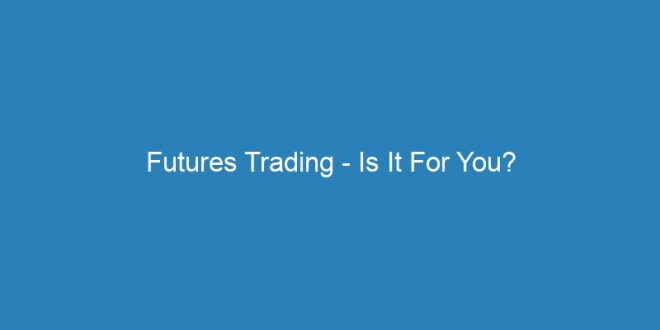What Are Futures Markets And Why Would Anyone Want To Trade Them?
Wikipedia’s answer is: Futures Market is a financial exchange where people can trade futures contracts. So what is a futures contract? A futures contract is a legally binding agreement to buy a certain amount of a commodity or a financial instrument at a certain price with a certain delivery date at a certain point in the future.
It is important to emphasize the word contract. The first important difference between the futures market and the stock exchange, for example, is that contracts and not stocks are traded on the futures market. You do not buy or sell shares (or parts of) any company. Futures contracts are agreements between investors to trade certain commodities or financial instruments, such as gallons of gas or tons of wheat.
It’s easy to see how raw materials work. For example, an airline undertakes to buy 100,000 gallons of fuel for its aircraft at current market prices but will not accept delivery until a later date.
This is why Southwest Airlines makes money when the fuel price is $ 140 / barrel and other airlines don’t have it. They had negotiated futures contracts with several oil companies a few years earlier when oil prices were cheaper and waited for delivery until 2007-2008. When the price of oil is cheap again, they will buy futures contracts for 2011/2012 delivery.
That’s all well and good, you say, but it’s not really about using a trading system with a trading strategy to negotiate.
There is a level of risk for every futures contract. Futures contracts increase the risk to the value of the underlying.
The risk the southwest deserves. If the price of crude oil falls below what they are paying, they are paying more than they should. At the same time, they reduce the risk because they believe that the price of oil will be higher than their contract price. In their case, leverage is profitable.
Now look at the oil companies. They reduced the risk, believing the price of crude oil would fall below the contract price negotiated with Southwest. They take the risk because the price of oil rises higher than the contract (and with it, forfeits any additional revenue they could have made). In this case, your leverage is not as good as it should be.
You stop here and say I’m not Southwest Airlines. I am an individual day trader. I don’t want to buy 100,000 gallons of crude oil. How can I trade futures?
The Chicago Mercantile Exchange (CME), on which most futures contracts are traded, recognizes that individual investors want to trade futures like large institutions; Individual traders also want to use their risk. They also understand that small investors don’t risk millions of dollars on gas contracts or tons of wheat. Therefore, CME decided to create an investment environment that would attract individual investors to trade futures.
Remember, as a retail investor, there are many exchanges available to you on your trading day. You can invest in large-cap stocks on the NYSE, technology stocks with NASDAQ, ETFs – AMEX, and options on CBOT. To attract investors to trading futures, CME created an exchange that pales in comparison to other exchanges.
First, CME Emini created futures that were specifically designed for retail investors. E in emini means that they are traded electronically. You have a trading platform right on your desktop, where your trades are logged into the CME. Mini means that the contract is a smaller version of the same contract that is traded by a larger institution.
The most popular Emini CME is the S & P500. This contract is based on the S&P500 index, which represents the top 500 stocks on the NYSE. The S&P500 index is price weighted, so some stocks have more weight or “importance” than others. (larger companies can move the index value higher or lower).
 KRETENG.COM Website Review Bisnis, Tempat dan Harga Produk Terbaik di Indonesia
KRETENG.COM Website Review Bisnis, Tempat dan Harga Produk Terbaik di Indonesia

